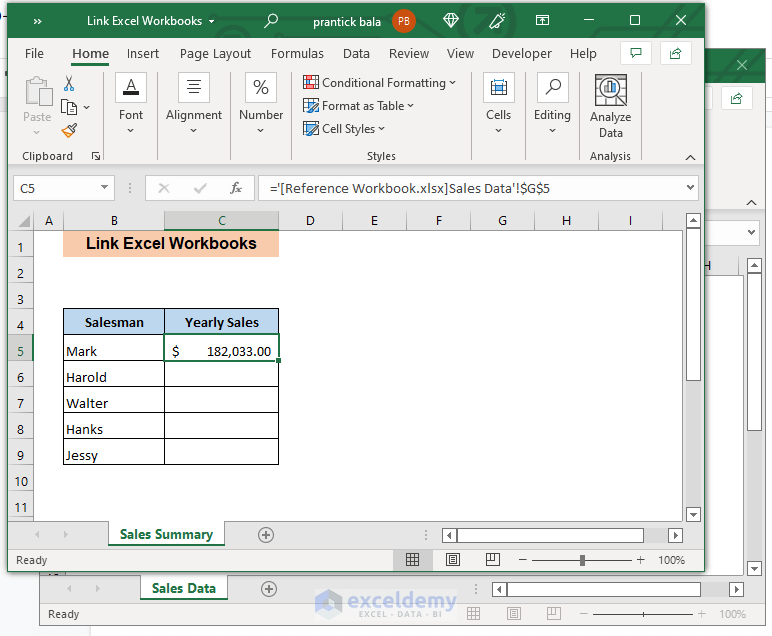Link Values Across Excel Sheets: A Quick Guide

Exploring the Power of Excel Sheet Linking

If you've ever worked with large datasets in Microsoft Excel, you'll appreciate the utility of linking data across different spreadsheets. This article will guide you through the various methods to link values across Excel sheets, ensuring your data remains consistent, updated, and easily managed. Let's dive into how you can leverage Excel's robust functionalities for efficient data handling.
Why Link Values Across Sheets?

Before we delve into the "how," let's understand the "why." Here are a few compelling reasons to link data across Excel sheets:
- Maintain Data Integrity: Ensure that all sheets reflect the latest changes with minimal effort.
- Reduce Redundancy: Avoid duplicate data entry, which minimizes errors and saves time.
- Ease of Updates: Update information in one place and automatically reflect these changes elsewhere.
How to Link Data Using Formulas

Here are the steps to link data using Excel's built-in formulas:
- Open Your Workbooks: Have the source and destination Excel workbooks open.
- Select the Cell: In the destination sheet, click the cell where you want the linked data to appear.
- Enter the Formula:
- If linking from the same workbook: Use =[SheetName]!CellReference.
- If linking from a different workbook: Use ='C:\Path\[WorkbookName]SheetName'!CellReference.
- Press Enter: The value from the source cell will now appear in the destination cell.
⚠️ Note: Use absolute cell references ($) when creating links to prevent link issues upon cell movement.
Using Paste Link Feature

Another effective method to link data:
- Copy the Data: Select and copy the data you want to link.
- Open Paste Special: In the destination sheet, right-click and choose "Paste Special."
- Link Data: Select "Paste Link" to create a link instead of pasting values.
This method is quick for linking multiple cells simultaneously.
Creating Hyperlinks

Hyperlinks provide another way to navigate between Excel sheets:
- Select the Cell: Choose where you want to create the hyperlink.
- Insert Hyperlink: Go to "Insert" > "Hyperlink" or press Ctrl+K.
- Link to: Select "Place in This Document" to link within the workbook or "Existing File or Web Page" for external files.
Advanced Techniques for Dynamic Linking

Dynamic links update automatically when the source data changes. Here are some advanced techniques:
- Using VLOOKUP or INDEX MATCH: To dynamically pull data based on specific criteria.
- Linked PivotTables: Connect PivotTables across sheets to dynamically pull summarized data.
- External Data Sources: Utilize Excel's ability to connect to external databases or data sources for live updates.
Managing Linked Data

When dealing with linked data, consider:
- Auditing Links: Use the Data Tab's "Edit Links" feature to manage and troubleshoot links.
- Link Management: Be aware of file locations to avoid broken links when moving workbooks.
🔍 Note: Regularly audit your links to ensure data integrity and avoid errors from outdated or missing links.
In summary, linking values across Excel sheets not only streamlines your workflow but also enhances data accuracy and consistency. By mastering these techniques, you’ll find managing complex data sets to be less daunting and more efficient, allowing for real-time data collaboration and updates. Whether you’re linking within the same workbook or connecting to external data sources, Excel provides the tools necessary for seamless data integration.
What happens if I delete the source sheet or workbook?

+
If you delete or move the source sheet or workbook, the links will break, resulting in #REF! errors in your destination cells.
Can I link to a specific named range?

+
Yes, you can link directly to a named range by using the range name in your formula, like ‘=SheetName!MyNamedRange’.
How do I know if my workbook has external links?

+
Go to the ‘Data’ tab, click ‘Edit Links’, and you’ll see all external links in the workbook listed.